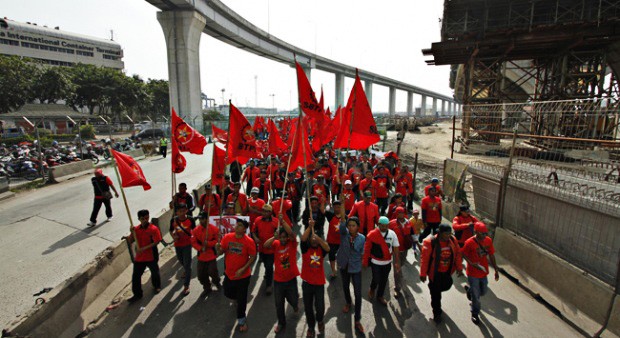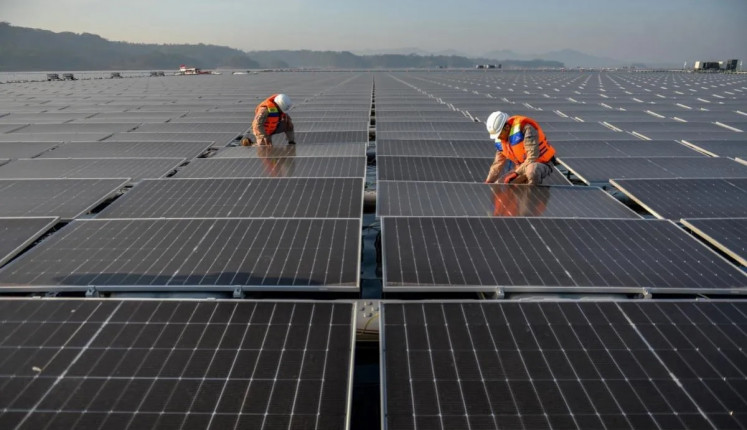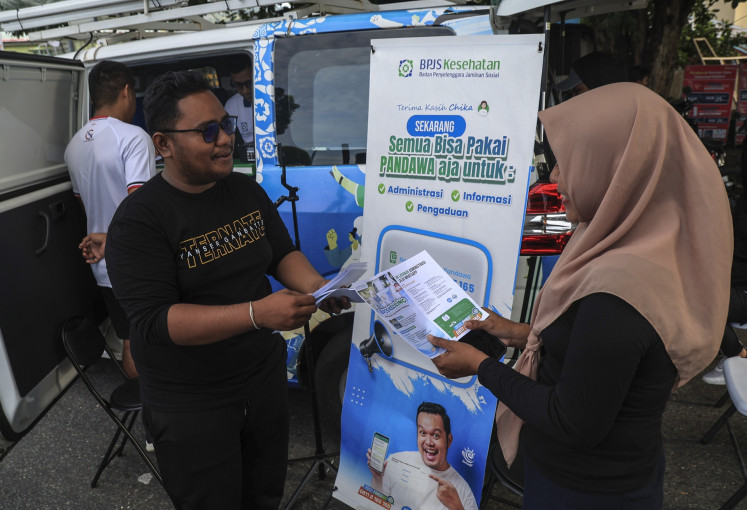Popular Reads
Top Results
Can't find what you're looking for?
View all search resultsPopular Reads
Top Results
Can't find what you're looking for?
View all search results'Protection' for low-skilled migrants leads to abuse
Change text size
Gift Premium Articles
to Anyone
T
he exploitation, abuse and enslavement of low-skilled migrant workers in Southeast Asia continues. This makes only more blatant ASEAN’s failure to enforce the Declaration on the Protection and Promotion of the Rights of Migrant Workers signed in 2007.
The resolution to the deadlock — stemming from the opposition of destination countries, particularly Singapore and Malaysia — would commit ASEAN member states to align their immigration and labor laws and improve migrants’ working and living conditions.
But how can protection for low-skilled migrants be achieved when discrimination against them lies at the core of ASEAN’s double standard approach to migration?
Although far from aiming for full labor mobility à la the EU, ASEAN has recently budged toward more openness for selected groups of citizens.
The ASEAN Economic Community, launched in December 2015, endorses the movement of professionals in eight occupations — engineering, nursing, architecture, medicine, dentistry, tourism, surveying and accounting — through Mutual Recognition Agreements that allow the easing of visa rules among member states. ASEAN also encourages the mobility of students, lecturers, investors and corporate executives.
Yet there is still no discussion of liberalizing the flow of low-skilled workers. Reluctant to integrate them on nationalist and elitist grounds, governments in need of their labor have opted for contract-based migration of a temporary nature under bilateral agreements with the origin countries.
Singapore’s dual-track policy encourages independent inflows for the highly skilled, but severely
regulates inflows for lower-skilled workers through bilateral schemes, broker companies, work permit levies, security bonds and dependency ceilings.
In Thailand, lower-skilled migrants from Cambodia, Laos and Myanmar fall under a registration scheme that lies outside of that for other nationalities and types of workers and leaves them semi-undocumented and in a precarious state.
Numbers do not justify such biased treatment. Low-skilled workers constitute the vast majority of Southeast Asia’s migrant labor. 80 percent of the 6.5 million intra-ASEAN migrants in 2013 were low-skilled, according to UN data. Thailand hosted about 3.5 million of them from mainland Southeast Asia. Malaysia and Singapore have about 1.5 million and 1 million migrant workers, respectively, from neighboring countries, particularly Indonesia.
Also in 2013, the eight professions privileged in regional migration policies comprised less than 1.5 percent of ASEAN’s labor force.
Low-skilled migrant workers are despised despite their contribution to the host country and to home countries through remittances, brokerage fees and skills transfer.
Coming from weaker economies they contribute to the growth of wealthier countries in the region, compensating for an ageing and relatively prosperous population that is no longer interested in manual jobs.
Demand for “cost-effective” migrant workers, compelled by poverty to accept lower wages and “dirty, dangerous, difficult” tasks, is high in labor-intensive industries such as construction, agriculture, fisheries and domestic employment. This demand is expected to grow with trade liberalization and the greater market competitiveness brought about by ASEAN integration.
The oft-heard argument that contract migration is needed to regulate migration also requires scrutiny, as it may actually feed undocumented migration. Contract labor schemes are expensive for migrants and burden them with rules unsuited to their needs.
Given inadequate avenues for legal migration, a large proportion migrants move through irregular means or become irregular in successive phases of the migration process by changing employers, moving to another location or overstaying their visas — all forbidden under their contracts.
The repeated tweaking of schemes to tighten controls has failed across the region, with business in Thailand and Malaysia the most dependent on undocumented — and cheaper — migrant labor.
For migrants, the promised advantage of safer migration has proven to be a chimera, as their rights are violated by the same contract system that is meant to protect them. This emerged loud and clear at an unprecedented gathering of thousands of migrants, mostly women, last November in Jember, East Java. It was — facilitated by the Migrant Care NGO and the National Authority for the Placement and Protection of Indonesian Overseas Workers and the University of Jember.
Systemic abuses were exposed such as migrants falling into debt due to high brokerage fees and low fixed salaries and wages, violence and harassment when work permits tie them to specific employers, the absence of rights to organize or join unions and women undergoing abortions for fear of being deported when pregnant.
Discussions at the same meeting showed that the policy of ASEAN governments to bar autonomous migration by low-skilled workers, arguing that this is for their protection, is paternalistic and unsubstantiated. Yes, they are vulnerable, but it is not for lack of courage, agency and entrepreneurship: How could they otherwise migrate and survive in the direst of circumstances?
Instead, it is the social and economic conditions that put them in a vulnerable position that need to be addressed.
The dehumanization of migrants extends to the personal sphere. While high-skilled workers may settle with their families, low-skilled workers are accepted in contract arrangements as “single” persons with no provisions for accompanying spouses or regular family reunions.
In host countries, low-skilled migrants are not expected to become engaged to or marry locals, since they are meant to be there only temporarily — even if the reality is different. Among its other discriminatory procedures, Singapore requires low-skilled migrants to undergo HIV, tuberculosis and, if female, pregnancy testing every six months. If the tests are positive, they are returned to their countries of origin.
Migrant baby births may also go against the wishes of both origin and destination countries: Thousands of children of Burmese migrants in Thailand are now stateless.
Patchwork solutions to ameliorate the contract labor system, trying to stop sending or receiving workers bilaterally, or treating abuses as incidental trafficking cases addressed by “rescuing” and “repatriating” workers are insufficient.
Real protection of low-skilled migrant workers can only occur if justice is placed at the center of the migration debate.
To be fair to all migrants, a drastic policy shift is required to shelve contract arrangements and the dual system differentiating low- from high-skilled workers.
Instead, governments should offer more than protection through reducing socio-economic gaps, endorsing decent work policies, strengthening migrants’ capacity to find jobs and negotiate favorable benefits on their own, consistently prosecuting exploiters, including migrants in decision-making, and formulating independent and permanent migration options for all migrants, irrespective of skill level.
A truly ASEAN Community implies recognition that all migrants contribute to regional economic growth and are peoples of ASEAN.
***
The writer is associate professor at Mahidol University and a visiting professor at Chulalongkorn University, Bangkok and emeritus regional director for Southeast Asia with the Rockefeller Foundation and the International Development Research Center This commentary will be part of the Reporting ASEAN: 2015 and Beyond series of IPS Asia-Pacific in partnership with the ASEAN Foundation.
---------------
We are looking for information, opinions, and in-depth analysis from experts or scholars in a variety of fields. We choose articles based on facts or opinions about general news, as well as quality analysis and commentary about Indonesia or international events. Send your piece to community@jakpost.com.










